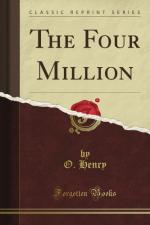“This is ridiculous,” said Rudolf, blusteringly, “to go without eating. You must quit making election bets of this kind. Supper is ready.” He helped her to a chair at the table and asked: “Is there a cup for the tea?” “On the shelf by the window,” she answered. When he turned again with the cup he saw her, with eyes shining rapturously, beginning upon a huge Dill pickle that she had rooted out from the paper bags with a woman’s unerring instinct. He took it from her, laughingly, and poured the cup full of milk. “Drink that first” he ordered, “and then you shall have some tea, and then a chicken wing. If you are very good you shall have a pickle to-morrow. And now, if you’ll allow me to be your guest we’ll have supper.”
He drew up the other chair. The tea brightened the girl’s eyes and brought back some of her colour. She began to eat with a sort of dainty ferocity like some starved wild animal. She seemed to regard the young man’s presence and the aid he had rendered her as a natural thing—not as though she undervalued the conventions; but as one whose great stress gave her the right to put aside the artificial for the human. But gradually, with the return of strength and comfort, came also a sense of the little conventions that belong; and she began to tell him her little story. It was one of a thousand such as the city yawns at every day—the shop girl’s story of insufficient wages, further reduced by “fines” that go to swell the store’s profits; of time lost through illness; and then of lost positions, lost hope, and—the knock of the adventurer upon the green door.
But to Rudolf the history sounded as big as the Iliad or the crisis in “Junie’s Love Test.”
“To think of you going through all that,” he exclaimed.
“It was something fierce,” said the girl, solemnly.
“And you have no relatives or friends in the city?”
“None whatever.”
“I am all alone in the world, too,” said Rudolf, after a pause.
“I am glad of that,” said the girl, promptly; and somehow it pleased the young man to hear that she approved of his bereft condition.
Very suddenly her eyelids dropped and she sighed deeply.
“I’m awfully sleepy,” she said, “and I feel so good.”
Then Rudolf rose and took his hat. “I’ll say good-night. A long night’s sleep will be fine for you.”
He held out his hand, and she took it and said “good-night.” But her eyes asked a question so eloquently, so frankly and pathetically that he answered it with words.
“Oh, I’m coming back to-morrow to see how you are getting along. You can’t get rid of me so easily.”
Then, at the door, as though the way of his coming had been so much less important than the fact that he had come, she asked: “How did you come to knock at my door?”
He looked at her for a moment, remembering the cards, and felt a sudden jealous pain. What if they had fallen into other hands as adventurous as his? Quickly he decided that she must never know the truth. He would never let her know that he was aware of the strange expedient to which she had been driven by her great distress.




